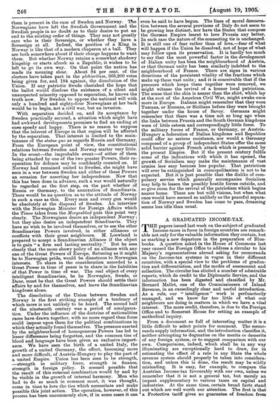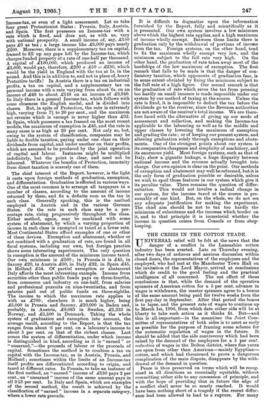A GRADUATED INCOME-TAX. T HE papers issued last week on the
subject of graduated Income-taxes in force in foreign countries are remark- able not only for the valuable information they contain, but as marking a new departure in the preparation of Blue- books. A question asked in the House of Commons last year caused the Foreign Office to address a circular to his Majesty's representatives abroad asking for memoranda on the Income-tax systems in vogue in their different countries, with a special view to the problems of gradua- tion and differentiation, and the modes of assessment and collection. The circular has elicited a number of admirable reports, which do credit to the Diplomatic Service, and the information has been digested and classified by Mr. Bernard Mallet, one of the Commissioners of Inland Revenue, in an exceedingly clear and useful introduction. As a rule, our " intelligence " work is perfunctorily. managed, and we know far too little of what our neighbours are doing in matters in which we have a vital interest. The more credit, therefore, is due to the Foreign Office and to Somerset House for setting an example of methodical inquiry.
From a document so full of interesting matter it is a little difficult to select points for comment. The memo- randa supply information, and the introduction classifies it, neither attempting to dogmatise on the merits or demerits of any foreign system, or to suggest comparison with our own. Comparisons, indeed, which shall be in any way illuminating are exceptionally hard to draw, for in estimating the effect of a rate in any State the whole revenue system should properly be taken into considera- tion, and unless this is done, the result may be wildly misleading. It is easy, for example, to compare the Austrian Income-tax favourably with our own, unless we remember that it is not a general tax, but merely an impost supplementary to various taxes on capital and industries. At the same time, certain broad facts stand out which are well worth our attention. The first is that a Protective tariff gives no guarantee of freedom from Income-tax, or even of a light assessment. Let us take four great Protectionist States : Prussia, Italy, Austria, and Spain. The first possesses an Income-tax with a rate which is fixed, and does not, as with us, vary with national prosperity. A small income of, say, £150 pays £3 as tax ; a large income like £5,000 pays nearly .£200. Moreover, there is a supplementary tax on capital, framed to fill up any gaps left by the Income-tax, which charges funded property at a rate of one-half per thousand. A capital of £100,000, which produced an income of £5,000, would pay, therefore, £200 -I- £50 --,- £250, which would be the yield in England with the tax at is. in the pound. And this is in addition to, and not in place of, heavy Protective tariffs ! In Austria there is a tax on industrial profits, a tax on capital, and a supplementary tax on personal income with a rate varying from about 6s. on an income of .248 to about £148 on an income of £3,840. In Italy there is a general Income-tax, which follows with some closeness the English model, and is divided into classes. But, in spite of Protection, the rate is extremely high, varying from 7i to 20 per cant., and the maximum net revenue which is exempt is never higher than £32. In Spain, which possesses a tax framed on the most recent models, the maximum of exemption is £45, and the rate in many cases is as high as 20 per cent. Not only so, but, owing to the system of classification, companies may be liable to double taxation, paying under one class on their dividends from capital, and under another on their profits, which are assumed to be produced by the joint operation of capital and labour. Instances might be multiplied indefinitely, but the point is clear, and need not be laboured. Whatever the benefits of Protection, immunity from direct taxation is scarcely one of them.
The chief interest of the Report, however, is the light it casts upon foreign methods of graduation, exemption, and differentiation. Graduation is effected in various ways. One of the most common is to arrange all taxpayers in a number of classes, according to the amount of income returned by them, and fix a definite sum as the tax in each class. Generally speaking, this is the method employed in Austria and in the various German States. Or the rate in each class may be a per- centage rate, rising progressively throughout the class. Either method, again, may be combined with some system of abatement, by which a varying proportion of income in each class is exempted or taxed at a lower rate. Most Continental States afford examples of one or other of these devices. Exemption and abatement, whether or not combined with a graduation of rate, are found in all fiscal systems, including our own, but foreign practice shows some interesting experiments. The only question in exemption is the amount of the minimum income taxed. Our own minimum is £160; in Prussia it is £45, in Saxony £20, in Austria £50, in Italy £32, in Spain £45, in Holland £54. Of partial exemption or abatement Italy affords the most interesting example. Income from securities other than public funds pays on three-fourths, from commerce and industry on one-half, from salaries and professional pursuits on nine-twentieths, and from salaries paid out of public funds on three-eighths. The income to which the maximum rate applies is with us £700; elsewhere it is much higher, being £5,000 in Prussia and Saxony, £10,000 in Baden and, probably, in Austria, £8,083 in Sweden, £1,333 in Norway, and £5,500 in Denmark. Taking the whole system of graduation and exemption into account, the average result, according to the Report, is that the tax ranges from about .6 per cent. on a labourer's income to about 5 per cent, on that of the richest classes. Last comes the system of differentiation, under which income is distinguished in kind, according as it is " earned " or "unearned,"—the proceeds of labour or the proceeds of capital. Sometimes the method is to combine a tax on capital with the Income-tax, as in Austria, Prussia, and Holland ; sometimes within the limits of an Income-tax itself profits are differentiated according to origin, and taxed, at different rates. In Prussia, to take an instance of the first method, an " earned " income of £150 pays 2 per cent., an " unearned " income of the same amount pays in all 3.25 per cent. In Italy and Spain, which are examples of the second method, the result is achieved by the classification of " earned " income in a separate category, where a lower rate prevails. It. is difficult to dogmatise upon the information furnished by the Report, fully and scientifically as it is presented. Our own system involves a low minimum above which the highest rate applies, and a high maximum of income wholly exempt. Between these limits there is graduation only by the withdrawal of portions of income from the tax. Foreign systems, on the other hand, tend to fix the maximum wholly exempt very low, and the minimum subject to the full rate very high. On the other hand, the graduation of rate takes away most of the hardships of the low maximum of exemption. The first remark that falls to be made is that the danger of con- fiscatory taxation, which opponents of graduation fear, is to some extent obviated by fixing the minimum subject to the full rate at a high figure. Our second remark is that the graduation of rate which saves the tax from pressing too hardly on small incomes is made impossible under our system by our method of taxing at the source. Unless the rate is fixed, it is impossible to deduct the tax before the dividends go to the receiver, since the Revenue authorities are not aware of the receiver's total income. We are there- fore faced with the alternative of giving up our mode of assessment and collection, and making the Income-tax applicable to the labouring as well as to the middle and upper classes by lowering the maximum of exemption and grading the rate ; or of keeping our present system, and allowing graduation solely through exemptions and abate- ments. One of the strongest points about our system is its comparative cheapness and simplicity of machinery, and its enormous yield. Most foreign systems, such as that of Italy, show a gigantic leakage, a huge disparity between national income and the revenue actually brought into charge. Our own opinion is clear on the point. Our methods of exemption and abatement may well be reformed, but it is the only form of graduation possible or desirable, unless we wish to spoil those features in our system which give it its peculiar value. There remains the question of differ- entiation. This would not involve a radical change in our system, for the income taxed at the source is pre- sumably of one kind. But, on the whole, we do not see any adequate justification for making the experiment. The chief aim should be not to tax too hardly the minimum of subsistence and the incomes which border on it, and to that principle it is immaterial whether the income in question comes from Consols or from shop- keeping.



































 Previous page
Previous page